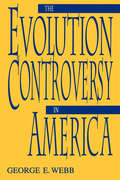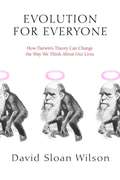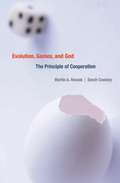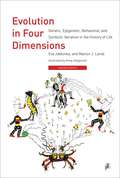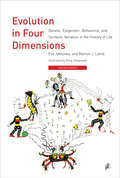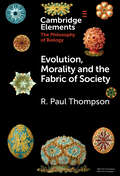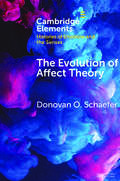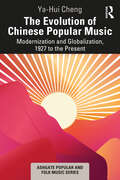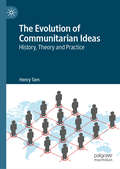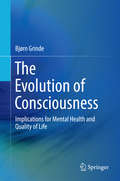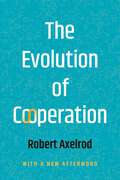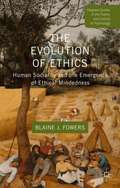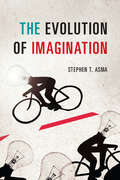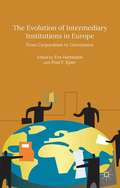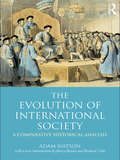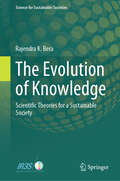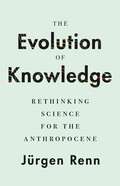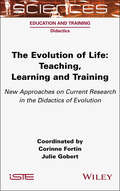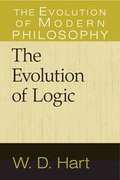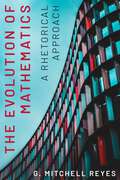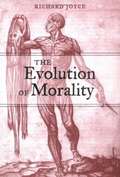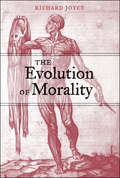- Table View
- List View
The Evolution Controversy in America
by George E. WebbA comprehensive intellectual history of America’s century-old debate over teaching evolution in public schools.For well over a century, the United States has witnessed a prolonged debate over the teaching of organic evolution in the nation’s public schools. The controversy that began with the publication of Darwin’s Origin of the Species had by the 1920s expanded to include theologians, politicians, and educators. The Scopes trial of 1925 provided the growing antievolution movement with significant publicity and led to a decline in the teaching of evolution.In The Evolution Crisis in America, George E. Webb details how efforts to improve science education in the wake of Sputnik resurrected antievolution sentiment and led to the emergence of “creation science” as the most recent expression of that sentiment. Creationists continue to demand “balanced treatment” of theories of creation and evolution in public schools, even though their efforts have been declared unconstitutional in a series of federal court cases. Their battles have been much more successful at the grassroots level, garnering support from local politicians and educators. Webb attributes the success of creationists primarily to the lack of scientific literacy among the American public.
Evolution for Everyone: How Darwin's Theory Can Change the Way We Think About Our Lives
by David Sloan WilsonWhat is the biological reason for gossip? For laughter? For the creation of art? Why do dogs have curly tails? What can microbes tell us about morality? These and many other questions are tackled by renowned evolutionist David Sloan Wilson in this witty and groundbreaking new book. With stories that entertain as much as they inform, Wilson outlines the basic principles of evolution and shows how, properly understood, they can illuminate the length and breadth of creation, from the origin of life to the...
Evolution, Games, and God
by Martin A. Nowak Sarah CoakleyEvolution, Games, and God explores how cooperation and altruism, alongside mutation and natural selection, play a critical role in evolution, from microbes to human societies. Inheriting a tendency to cooperate and self-sacrifice on behalf of others may be as beneficial to a population’s survival as the self-preserving instincts of individuals.
Evolution in Four Dimensions
by Eva Jablonka Anna Zeligowski Marion J. LambThis new edition of the widely read Evolution in Four Dimensions has been revised to reflect the spate of new discoveries in biology since the book was first published in 2005, offering corrections, an updated bibliography, and a substantial new chapter. Eva Jablonka and Marion Lamb's pioneering argument proposes that there is more to heredity than genes. They describe four "dimensions" in heredity -- four inheritance systems that play a role in evolution: genetic, epigenetic (or non-DNA cellular transmission of traits), behavioral, and symbolic (transmission through language and other forms of symbolic communication). These systems, they argue, can all provide variations on which natural selection can act. Jablonka and Lamb present a richer, more complex view of evolution than that offered by the gene-based Modern Synthesis, arguing that induced and acquired changes also play a role. Their lucid and accessible text is accompanied by artist-physician Anna Zeligowski's lively drawings, which humorously and effectively illustrate the authors' points. Each chapter ends with a dialogue in which the authors refine their arguments against the vigorous skepticism of the fictional "I.M." (for Ipcha Mistabra -- Aramaic for "the opposite conjecture"). The extensive new chapter, presented engagingly as a dialogue with I.M., updates the information on each of the four dimensions -- with special attention to the epigenetic, where there has been an explosion of new research. Praise for the first edition"With courage and verve, and in a style accessible to general readers, Jablonka and Lamb lay out some of the exciting new pathways of Darwinian evolution that have been uncovered by contemporary research." -- Evelyn Fox Keller, MIT, author of Making Sense of Life: Explaining Biological Development with Models, Metaphors, and Machines"In their beautifully written and impressively argued new book, Jablonka and Lamb show that the evidence from more than fifty years of molecular, behavioral and linguistic studies forces us to reevaluate our inherited understanding of evolution." -- Oren Harman, The New Republic"It is not only an enjoyable read, replete with ideas and facts of interest but it does the most valuable thing a book can do -- it makes you think and reexamine your premises and long-held conclusions." -- Adam Wilkins, BioEssays
Evolution in Four Dimensions, revised edition: Genetic, Epigenetic, Behavioral, and Symbolic Variation in the History of Life (Life and Mind: Philosophical Issues in Biology and Psychology)
by Eva Jablonka Marion J. LambA pioneering proposal for a pluralistic extension of evolutionary theory, now updated to reflect the most recent research. This new edition of the widely read Evolution in Four Dimensions has been revised to reflect the spate of new discoveries in biology since the book was first published in 2005, offering corrections, an updated bibliography, and a substantial new chapter. Eva Jablonka and Marion Lamb's pioneering argument proposes that there is more to heredity than genes. They describe four “dimensions” in heredity—four inheritance systems that play a role in evolution: genetic, epigenetic (or non-DNA cellular transmission of traits), behavioral, and symbolic (transmission through language and other forms of symbolic communication). These systems, they argue, can all provide variations on which natural selection can act. Jablonka and Lamb present a richer, more complex view of evolution than that offered by the gene-based Modern Synthesis, arguing that induced and acquired changes also play a role. Their lucid and accessible text is accompanied by artist-physician Anna Zeligowski's lively drawings, which humorously and effectively illustrate the authors' points. Each chapter ends with a dialogue in which the authors refine their arguments against the vigorous skepticism of the fictional “I.M.” (for Ipcha Mistabra—Aramaic for “the opposite conjecture”). The extensive new chapter, presented engagingly as a dialogue with I.M., updates the information on each of the four dimensions—with special attention to the epigenetic, where there has been an explosion of new research. Praise for the first edition“With courage and verve, and in a style accessible to general readers, Jablonka and Lamb lay out some of the exciting new pathways of Darwinian evolution that have been uncovered by contemporary research.”—Evelyn Fox Keller, MIT, author of Making Sense of Life: Explaining Biological Development with Models, Metaphors, and Machines“In their beautifully written and impressively argued new book, Jablonka and Lamb show that the evidence from more than fifty years of molecular, behavioral and linguistic studies forces us to reevaluate our inherited understanding of evolution.”—Oren Harman, The New Republic“It is not only an enjoyable read, replete with ideas and facts of interest but it does the most valuable thing a book can do—it makes you think and reexamine your premises and long-held conclusions.”—Adam Wilkins, BioEssays
Evolution, Morality and the Fabric of Society (Elements in the Philosophy of Biology)
by R. Paul ThompsonRecent interest in the evolution of the social contract is extended by providing a throughly naturalistic, evolutionary account of the biological underpinnings of a social contract theory of morality. This social contract theory of morality (contractevolism) provides an evolutionary justification of the primacy of a moral principle of maximisation of the opportunities for evolutionary reproductive success (ERS), where maximising opportunities does not entail an obligation on individuals to choose to maximise their ERS. From that primary principle, the moral principles of inclusion, individual sovereignty (liberty) and equality can be derived. The implications of these principles, within contractevolism, are explored through an examination of patriarchy, individual sovereignty and copulatory choices, and overpopulation and extinction. Contractevolism is grounded in evolutionary dynamics that resulted in humans and human societies. The most important behavioural consequences of evolution to contractevolism are reciprocity, cooperation, empathy, and the most important cognitive consequences are reason and behavioural modification.
The Evolution of Affect Theory: The Humanities, the Sciences, and the Study of Power (Elements in Histories of Emotions and the Senses)
by Donovan O. SchaeferAcross the humanities, a set of interrelated concepts - excess, becoming, the event - have gained purchase as analytical tools for thinking about power. Some versions of affect theory rely on Gilles Deleuze's concept of 'becoming', proposing that affect is best understood as a field of dynamic novelty. Reconsidering affect theory's relationship with life sciences, Schaefer argues that this procedure fails as a register of the analytics of power. By way of a case study, this work concludes with a return to the work of Saba Mahmood, in particular her 2005 study of the women's mosque movement in Cairo, Politics of Piety.
The Evolution of Chemical Knowledge: A Formal Setting for its Analysis (Wissenschaft und Philosophie – Science and Philosophy – Sciences et Philosophie)
by Jürgen Jost Guillermo RestrepoChemistry shapes and creates the disposition of the world's resources and provides novel substances for the welfare and hazard of our civilisation at an exponential rate. Can we model the evolution of chemical knowledge? This book not only provides a positive answer to the question, it provides the formal models and available data to model chemical knowledge as a complex dynamical system based on the mutual interaction of the social, semiotic and material systems of chemistry. These systems, which have evolved over the history, include the scientists and institutions supporting chemical knowledge (social system); theories, concepts and forms of communication (semiotic system) and the substances, reactions and technologies (material system) central for the chemical practice. These three systems, which have traditionally been mostly studied in isolation, are brought together in this book in a grand historical narrative, on the basis of comprehensive data sets and supplemented by appropriate tools for their formal analysis. We thereby develop a comprehensive picture of the evolution of chemistry, needed for better understanding the past, present and future of chemistry as a discipline. The interdisciplinary character of this book and its non-technical language make it an ideal complement to more traditional material in undergraduate and graduate courses in chemistry, history of science and digital humanities.
The Evolution of Chinese Popular Music: Modernization and Globalization, 1927 to the Present (Ashgate Popular and Folk Music Series)
by Ya-Hui ChengYa-Hui Cheng examines the emergence of popular music genres – jazz, rock, and hip-hop – in Chinese society, covering the social underpinnings that shaped the development of popular music in China and Taiwan, from imperialism to westernization and from modernization to globalization. The political sensitivities across the strait have long eclipsed the discussion of these shared sonic intimacies. It was not until the rise of the digital age, when entertainment programs from China and Taiwan reached social media on a global scale, that audiences realized the existence of this sonic reciprocation. Analyzing Chinese pentatonicism and popular songs published from 1927 to the present, this book discusses structural elements in Chinese popular music to show how they aligned closely with Chinese folk traditions. While the influences from Western genres are inevitable under the phenomenon of globalization, Chinese songwriters utilized these Western inspirations to modernize their musical traditions. It is a sensitivity for exhibiting cultural identities that enabled popular music to present a unique Chinese global image while transcending political discord and unifying mass cultures across the strait.
The Evolution of Communitarian Ideas: History, Theory and Practice
by Henry TamThis book deals with three key questions about communitarian ideas: how to distinguish what constitutes communitarian thinking; what lessons to take from the historical development of communitarian arguments; and why their practical implications are relevant in devising reforms at the local, national, and global levels. Each chapter covers a distinct period, with a critical exposition of the leading thinkers of that time who contributed to communitarian philosophy and politics. Beginning with an examination of the rise of proto-communitarian ideas in classical Western and Eastern thought, the book closes with a review of communitarian responses to the emergent social and technological changes in the 21st century. Readers will learn about the core features and significance of communitarian theories and practices in relation to morality, education, the economy, freedom and security, community development, and democratic governance; and how they compare and contrast with other ethical and intellectual outlooks.
The Evolution of Consciousness
by Bjørn GrindeThis book gives the reader an understanding of what consciousness is about, and of how to make conscious experiences more pleasant. It expands on a new theory that describes the evolutionary trajectory leading to conscious life forms. In short, the evidence suggests that consciousness first evolved some 300 million years ago as a consequence of the introduction of feelings. Feelings offer a strategy for making behavioural decisions. Besides playing a crucial role in the evolution of the human mind, they are a key factor in regard to mental health and quality of life. Fortunately, the human brain is plastic. By exploiting available options for modulating the mind, it is therefore possible to impact on what sort of experiences the brain serves. More specifically, you can strengthen the capacity for positive feelings and reduce the sway of negative feelings. The text covers biological, neurological, psychological, and philosophical aspects of the mind.
The Evolution of Cooperation: Revised Edition
by Robert AxelrodThe Evolution of Cooperation provides valuable insights into the age-old question of whether unforced cooperation is ever possible. Widely praised and much-discussed, this classic book explores how cooperation can emerge in a world of self-seeking egoists-whether superpowers, businesses, or individuals-when there is no central authority to police their actions. The problem of cooperation is central to many different fields. Robert Axelrod recounts the famous computer tournaments in which the "cooperative” program Tit for Tat recorded its stunning victories, explains its application to a broad spectrum of subjects, and suggests how readers can both apply cooperative principles to their own lives and teach cooperative principles to others.
The Evolution of Educational Thought: Lectures on the formation and development of secondary education in France (The\yale Cultural Sociology Ser.)
by Emile DurkheimFirst Published in 2005. Routledge is an imprint of Taylor & Francis, an informa company.
The Evolution of Ethics
by Blaine J. FowersIn this ground-breaking book, Aristotelian and evolutionary understandings of human social nature are brought together to provide an integrative, psychological account of human ethics. The book emphasizes the profound ways that human identity and action are immersed in an ongoing social world.
The Evolution of Imagination
by Stephen T. AsmaConsider Miles Davis, horn held high, sculpting a powerful musical statement full of tonal patterns, inside jokes, and thrilling climactic phrases—all on the fly. Or think of a comedy troupe riffing on a couple of cues from the audience until the whole room is erupting with laughter. Or maybe it’s a team of software engineers brainstorming their way to the next Google, or the Einsteins of the world code-cracking the mysteries of nature. Maybe it’s simply a child playing with her toys. What do all of these activities share? With wisdom, humor, and joy, philosopher Stephen T. Asma answers that question in this book: imagination. And from there he takes us on an extraordinary tour of the human creative spirit. Guided by neuroscience, animal behavior, evolution, philosophy, and psychology, Asma burrows deep into the human psyche to look right at the enigmatic but powerful engine that is our improvisational creativity—the source, he argues, of our remarkable imaginational capacity. How is it, he asks, that a story can evoke a whole world inside of us? How are we able to rehearse a skill, a speech, or even an entire scenario simply by thinking about it? How does creativity go beyond experience and help us make something completely new? And how does our moral imagination help us sculpt a better society? As he shows, we live in a world that is only partly happening in reality. Huge swaths of our cognitive experiences are made up by “what-ifs,” “almosts,” and “maybes,” an imagined terrain that churns out one of the most overlooked but necessary resources for our flourishing: possibilities. Considering everything from how imagination works in our physical bodies to the ways we make images, from the mechanics of language and our ability to tell stories to the creative composition of self-consciousness, Asma expands our personal and day-to-day forms of imagination into a grand scale: as one of the decisive evolutionary forces that has guided human development from the Paleolithic era to today. The result is an inspiring look at the rich relationships among improvisation, imagination, and culture, and a privileged glimpse into the unique nature of our evolved minds.
The Evolution of Intermediary Institutions in Europe: From Corporatism to Governance
by Eva Hartmann Poul F. KjaerThis book investigates the consecutive shifts between three types of intermediary institutions in the European context: Corporatist, Neo-corporatist and Governance institutions. It does so by combining insights from European Political Economy; European Integration and governance studies; and, socio-legal studies in the European context.
The Evolution of International Society: A Comparative Historical Analysis
by Adam Watson`This is a real feast of a book. . . . a landmark book. It is clear enough to be used as a teaching text, and could make an excellent introduction to the discipline for those courageous enough to revise their courses. ' International Affairs `This is a bold, successful and valuable book. . . It is written with admirable clarity and merciful conciseness. ' International Relations `A stunning success. Watson's book is a masterful piece of theoretical and historical analysis. ' John A. Vasquez, Rutgers University Adam Watson, who died in 2007, was a former diplomat who in his later academic career became a pioneer of the discipline of international relations. Originally published in 1992, The Evolution of International Society made a major contribution to international theory and to our perception of how relations between states operate, and established Watson's place within the canon. This acclaimed and uniquely comprehensive work explains how international societies function across time, starting by examining the ancient state systems before turning to look in detail at the current worldwide international society. The book demonstrates that relations between states are not normally anarchic, but are in fact organized and regulated by elaborate rules and practices. In this timely reissue, a new introduction by Barry Buzan and Richard Little assesses Adam Watson's career as a diplomat and examines how his work as a practitioner shaped his subsequent thinking about the nature of international society. It then contextualises Watson's original work, situates it alongside current work in the area and identifies the originality of Watson's key arguments, helping us to understand Watson's place within the canon.
The Evolution of Knowledge: Scientific Theories for a Sustainable Society (Science for Sustainable Societies)
by Rajendra K. BeraThis book emphasizes the rising need for people to have a basic understanding of science and technology and the emphatic role they can play in shaping the AI-driven future, especially in terms of creating sustainable societies with growing job opportunities. This book highlights why a smoothly functioning society will require, but does not yet possess in critical numbers, policymakers, senior managers, government officials, and those entering the high-end of the AI-driven job market who have a shared vision and a shared understanding of how science shapes the future of sustainable societies.This book makes the case that the destiny of Homo sapiens is not just about evolutionary biology but increasingly about evolutionary knowledge. This book describes the web of knowledge where scientific theories appear as intellectual constructs, which lead to new knowledge that open opportunities for gainful human employment for the well-educated while eliminating jobsfor the less-educated by advancing AI in a predator–prey adversarial model (the logistic map), thus raising livelihood concerns across wide swathes of human population.This inevitably leads to the question, “How should intellectual property rights, especially patents, be granted and protected when AI becomes advanced enough to invent without human intervention?” To answer this question, lawmakers, policymakers, managers, government officials, judiciary, enforcement agencies, etc., must have sufficient knowledge of how scientific theories impact modern society. After reading this book, the reader will be able to find answers to the following questions:• How do scientific theories impact modern society?• What is the intellectual base on which science and technology policies are founded?• Why do individuals across a population need to possess scientific knowledge?• What are the rising concerns of peoplein finding sustainable employment in an AI-driven world?• What is the compelling need to understand the role of patentable inventions in a world where intellectual property is wealth?
The Evolution of Knowledge: Rethinking Science for the Anthropocene
by Jürgen RennA fundamentally new approach to the history of science and technologyThis book presents a new way of thinking about the history of science and technology, one that offers a grand narrative of human history in which knowledge serves as a critical factor of cultural evolution. Jürgen Renn examines the role of knowledge in global transformations going back to the dawn of civilization while providing vital perspectives on the complex challenges confronting us today in the Anthropocene—this new geological epoch shaped by humankind.Renn reframes the history of science and technology within a much broader history of knowledge, analyzing key episodes such as the evolution of writing, the emergence of science in the ancient world, the Scientific Revolution of early modernity, the globalization of knowledge, industrialization, and the profound transformations wrought by modern science. He investigates the evolution of knowledge using an array of disciplines and methods, from cognitive science and experimental psychology to earth science and evolutionary biology. The result is an entirely new framework for understanding structural changes in systems of knowledge—and a bold new approach to the history and philosophy of science.Written by one of today's preeminent historians of science, The Evolution of Knowledge features discussions of historiographical themes, a glossary of key terms, and practical insights on global issues ranging from climate change to digital capitalism. This incisive book also serves as an invaluable introduction to the history of knowledge.
The Evolution of Life: Teaching, Learning and Training - New Approaches on Current Research in the Didactics of Evolution
by Corinne Fortin Julie GobertThe aim of this collective work is to give an account of the topicality and dynamics of new research in the didactics of evolution, by articulating francophone and international work. The various contributions pursue a reflection on the challenges of teaching and learning about evolution, based on historical, epistemological and societal approaches. The themes addressed illustrate the vitality and diversity of research issues in educational sciences, from primary school to university. Structured around different theoretical fields (problematization, didactics of the curriculum, nature of science, etc.), this book explores the content, teaching and learning processes and approaches, teaching practices, as well as pre-service and in-service teacher training, with a view to both intelligibility and feasibility.
The Evolution of Logic
by W. D. HartExamines the relations between logic and philosophy over the last 150 years. Logic underwent a major renaissance beginning in the nineteenth century. Cantor almost tamed the infinite, and Frege aimed to undercut Kant by reducing mathematics to logic. These achievements were threatened by the paradoxes, like Russell's. This ferment generated excellent philosophy (and mathematics) by excellent philosophers (and mathematicians) up to World War II. This book provides a selective, critical history of the collaboration between logic and philosophy during this period. After World War II, mathematical logic became a recognized subdiscipline in mathematics departments, and consequently but unfortunately philosophers have lost touch with its monuments. This book aims to make four of them (consistency and independence of the continuum hypothesis, Post's problem, and Morley's theorem) more accessible to philosophers, making available the tools necessary for modern scholars of philosophy to renew a productive dialogue between logic and philosophy.
The Evolution of Mathematics: A Rhetorical Approach (RSA Series in Transdisciplinary Rhetoric)
by G. Mitchell ReyesThere is a growing awareness among researchers in the humanities and social sciences of the rhetorical force of mathematical discourse—whether in regard to gerrymandering, facial recognition technologies, or racial biases in algorithmic automation. This book proposes a novel way to engage with and understand mathematics via a theoretical framework that highlights how math transforms the social-material world.In this study, G. Mitchell Reyes applies contemporary rhetorical analysis to mathematical discourse, calling into question the commonly held view that math equals truth. Examining mathematics in historical context, Reyes traces its development from Plato’s teaching about abstract numbers to Euclidian geometry and the emergence of calculus and infinitesimals, imaginary numbers, and algorithms. This history reveals that mathematical innovation has always relied on rhetorical practices of making meaning, such as analogy, metaphor, and invention. Far from expressing truth hidden deep in reality, mathematics is dynamic and evolving, shaping reality and our experience of it.By bringing mathematics back down to the material-social world, Reyes makes it possible for scholars of the rhetoric and sociology of science, technology, and math to collaborate with mathematicians themselves in order to better understand our material world and public culture.
The Evolution of Modern Metaphysics: Making Sense of Things
by A. W. MooreThis book is concerned with the history of metaphysics since Descartes. Taking as its definition of metaphysics 'the most general attempt to make sense of things', it charts the evolution of this enterprise through various competing conceptions of its possibility, scope and limits. The book is divided into three parts, dealing respectively with the early modern period, the late modern period in the analytic tradition and the late modern period in non-analytic traditions. In its unusually wide range, A. W. Moore's study refutes the tired old cliché that there is some unbridgeable gulf between analytic philosophy and philosophy of other kinds. It also advances its own distinctive and compelling conception of what metaphysics is and why it matters. Moore explores how metaphysics can help us to cope with continually changing demands on our humanity by making sense of things in ways that are radically new.
The Evolution of Morality
by Richard JoyceIn The Evolution of Morality, Richard Joyce takes up these controversial questions, finding that the evidence supports an innate basis to human morality. As a moral philosopher, Joyce is interested in whether any implications follow from this hypothesis.
The Evolution of Morality (Life and Mind: Philosophical Issues in Biology and Psychology)
by Richard JoyceMoral thinking pervades our practical lives, but where did this way of thinking come from, and what purpose does it serve? Is it to be explained by environmental pressures on our ancestors a million years ago, or is it a cultural invention of more recent origin? In The Evolution of Morality, Richard Joyce takes up these controversial questions, finding that the evidence supports an innate basis to human morality. As a moral philosopher, Joyce is interested in whether any implications follow from this hypothesis. Might the fact that the human brain has been biologically prepared by natural selection to engage in moral judgment serve in some sense to vindicate this way of thinking—staving off the threat of moral skepticism, or even undergirding some version of moral realism? Or if morality has an adaptive explanation in genetic terms—if it is, as Joyce writes, "just something that helped our ancestors make more babies"—might such an explanation actually undermine morality's central role in our lives? He carefully examines both the evolutionary "vindication of morality" and the evolutionary "debunking of morality," considering the skeptical view more seriously than have others who have treated the subject.Interdisciplinary and combining the latest results from the empirical sciences with philosophical discussion, The Evolution of Morality is one of the few books in this area written from the perspective of moral philosophy. Concise and without technical jargon, the arguments are rigorous but accessible to readers from different academic backgrounds. Joyce discusses complex issues in plain language while advocating subtle and sometimes radical views. The Evolution of Morality lays the philosophical foundations for further research into the biological understanding of human morality.
